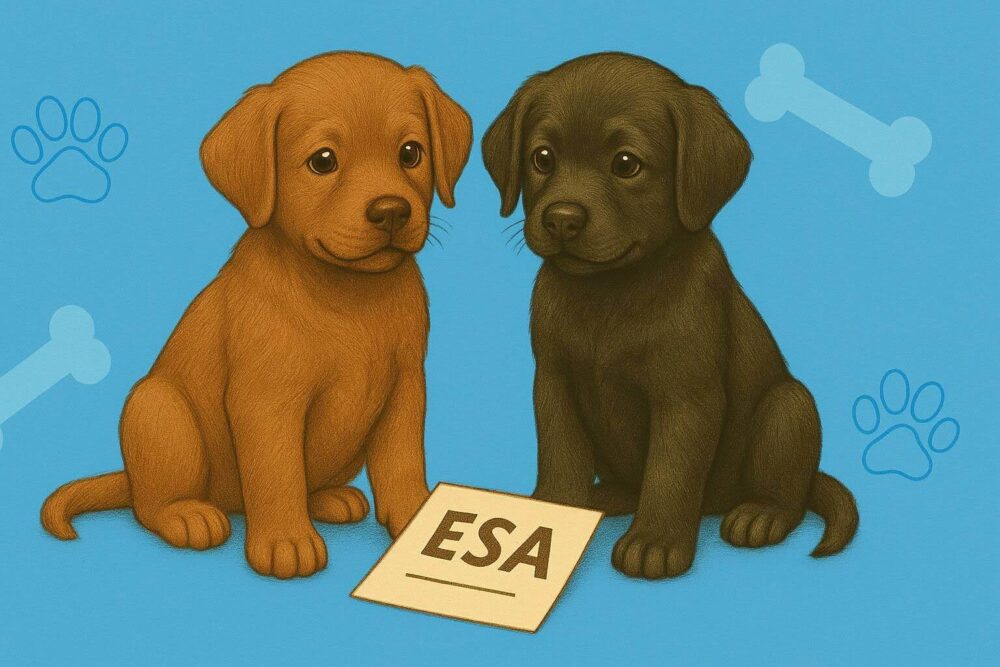Table of Contents
Ever had a rough day and found yourself instinctively reaching for a furry friend? That’s no coincidence—there’s actual science behind why petting Fluffy makes you feel better!
And with emotional support animals (ESAs), this natural connection goes beyond just a casual cuddle. In fact, it becomes a lifeline for someone dealing with mental health challenges.
So, what exactly makes ESAs so powerful and special? And how can you make one a part of your life? To help you figure things out, we’ll explore the many reasons to get an emotional support animal, the ways they can improve your mental health, and the process of welcoming an ESA into your life.
What Is an Emotional Support Animal?
Imagine having a living, breathing stress ball (but way cuter and significantly better at snuggling)—that’s basically what an ESA is. These support buddies are protected under the law and have special rights and benefits over regular pets, such as access to pet-free housing.
Unlike service animals, ESAs aren’t trained to perform specific tasks for disabilities. So, what’s their superpower? Well, it’s their natural ability to help you feel more at ease in tough situations through their calming presence (they’re also 100% free of judgment when you cry during rom-coms).
Almost any domesticated animal can be an ESA. Dogs and cats are the most common, but parrots, bunnies, and even potbellied pigs can do the job too. What makes an animal officially an ESA is an ESA letter from a licensed mental health professional (LMHP) confirming that the animal helps you manage symptoms of an emotional or psychological condition.
7 Reasons To Have an Emotional Support Animal for Better Mental Health
Emotional support animals offer a special kind of healing that doesn’t come in a pill bottle or therapy session. More specifically, here are some of the top reasons to get an ESA:
- Relieving anxiety and depression
- Encouraging an active lifestyle
- Eliminating loneliness
- Fostering a sense of purpose and responsibility
- Providing comfort during PTSD episodes
- Promoting social interaction and connection
- Securing housing regardless of pet restrictions
1. Relieving Anxiety and Depression
Ever notice how your breathing slows when you stroke a purring cat or a cuddly puppy? That’s your body’s stress response literally powering down in real time.
When anxiety or depression has you in its grip, just petting an animal for a few minutes can trigger a cocktail of feel-good chemicals in your brain:
| Hormone | Also Known As | What It Does |
| Serotonin | Happiness hormone | Boosts mood and promotes feelings of happiness |
| Dopamine | Motivation hormone, reward chemical | Enhances motivation; creates a sense of reward and pleasure |
| Oxytocin | Bonding or love hormone | Strengthens bonding and emotional connection |
These are the same neurotransmitters targeted by many antidepressant medications, and they can naturally lift your mood. In fact, studies show that interacting with animals can lower blood pressure and heart rate without the side effects of medications.
It’s not just about chemistry, though. It’s pretty hard to stay in the darkness when your goofy dog brings you their favorite toy or your cute bunny headbutts you for attention.
2. Encouraging an Active Lifestyle
Dogs need their daily walks, cats entice you into play sessions with feather toys, and even smaller pets encourage you to move as you care for them. Before you know it, you’re getting off the couch without even thinking about it as “exercise.”
This natural motivation to move works wonders where willpower often hits rock bottom. When your furry companion provides that gentle nudge (or enthusiastic bark), suddenly that walk around the block doesn’t seem like a chore—it becomes the highlight of your day.

Research backs this up—dog owners walk an average of 22 minutes more per day than non-dog owners. That’s an extra 2,760 steps daily! And physical activity—even the light kind—releases endorphins, the body’s natural mood elevators. So while your ESA may just be chasing a squirrel, they’re also helping you chase away the blues—no gym membership required.
3. Eliminating Loneliness
That wagging tail when you walk through the door doesn’t depend on whether you got the promotion or if your hair looks good. Your animal buddy offers something increasingly rare in our hyper-connected yet somehow disconnected world—unconditional companionship, 24×7.
On those nights when the silence in your apartment feels deafening, or during holidays when everyone seems paired up except you, your animal friend is there—a warm presence beside you, completely content just sharing your space or listening when you’re talking to yourself out loud (they probably think you’re talking to them anyway).
4. Fostering a Sense of Purpose and Responsibility
Getting out of bed might feel like scaling Mount Everest on some days. But when your ESA’s hungry eyes meet yours at 7 AM, suddenly you have a reason to put your feet on the floor.
Your four-legged family member depends on you for everything—food, water, exercise, and love. This creates a beautiful cycle—as you care for them, they care for you right back.
That guinea pig needs fresh vegetables. That cat’s litter needs changing. That dog needs his evening walk. And just like that, you’re participating in life again—one pet responsibility at a time.
This built-in responsibility creates structure in even the most chaotic lives. Feeding schedules, walking routines, and playtimes become anchors in your day. Even if you’re struggling with depression or anxiety, this gentle accountability is exactly the nudge needed to maintain healthy patterns.

5. Providing Comfort During PTSD Episodes
Here’s something amazing—some animals have a sixth sense for human emotions. Many dogs, for example, can pick up on sudden shifts in your heart rate, breathing, and even your body odor during panic or flashbacks.
While it’s service dogs that undergo specific training to perform tasks like interrupting anxiety or applying pressure therapy during PTSD episodes, emotional support animals can still provide comfort through their natural behaviors.
Your ESA might instinctively nudge your hand, climb into your lap, or simply press their body against yours when they sense something’s wrong. This natural pressure can help ground you, pulling your focus back to the present moment.
6. Promoting Social Interaction and Connection
Striking up conversations with strangers can be awkward. “Nice weather we’re having” only gets you so far. But add a dog wearing a cute bandana to the mix? Suddenly, you’re the most approachable person at the park.
ESAs are natural conversation starters. “What’s their name?” or “Can I pet them?” becomes the icebreaker that bypasses all the usual social anxiety. Dog parks, pet stores, and even sidewalk encounters turn into opportunities for human connection. This social support is especially valuable if you struggle with social anxiety or feelings of isolation.
In fact, studies show that people walking dogs have significantly more positive interactions with strangers than those walking alone. Your furry wingman essentially does the social heavy lifting for you, and before you know it, you’ve made a new friend.
7. Securing Housing Regardless of Pet Restrictions
Beyond physical and mental health benefits, ESAs offer a practical and legal advantage that can dramatically increase your housing options.
Under the Fair Housing Act (FHA), landlords and property managers must make reasonable accommodations for ESA owners with valid ESA letters—even in buildings with strict no-pet (or one-pet only) policies. An ESA letter confirms that your ESA is an assistance animal, not a regular pet. This is one of the primary reasons for getting an ESA letter since landlords can legally deny your request without it.
And the benefits don’t stop at simply being allowed through the door. With proper ESA paperwork, you’re also protected from many of the hidden costs and restrictions that typically come with pet ownership:
- No pet deposits—Housing providers can’t charge you a non-refundable amount just for having an animal
- No monthly pet fees—Say goodbye to that $50–$75 monthly pet rent for keeping an animal in the unit
- No breed or weight restrictions—Your apartment’s pet rules don’t apply to ESAs, which means landlords can’t deny your German Shepherd just because they consider it a dangerous breed
Down the road, these protections could potentially save you thousands of dollars—not to mention the priceless relief of keeping your snuggle buddy with you everywhere, regardless of their species.

How To Get an ESA—The Legal Process Explained
Now that you know some of the life-changing reasons to have an emotional support animal, you might be wondering how to actually make this happen.
The good news is that the process is more straightforward than many people think. Let’s break it down into three main steps:
- Understand the requirements to qualify for an ESA
- Get evaluated by a licensed mental health provider (LMHP)
- Receive your ESA letter
Understand the Requirements To Qualify for an ESA
Not everyone qualifies for an emotional support animal—and that’s actually a good thing. ESAs are meant for people with genuine mental health needs, not just anyone who wants to bypass pet restrictions.
To qualify, you need to have a mental or emotional condition that substantially impacts one or more major life activities as outlined in the Diagnostic and Statistical Manual of Mental Disorders (DSM-5-TR). This includes conditions like:
- Anxiety disorders
- Depression
- PTSD
- Phobias
- Panic attacks
- Bipolar disorder
- ADHD
- Autism spectrum disorders
You don’t necessarily need a pre-existing diagnosis or detailed medical records—many people discover they qualify only during their ESA evaluation.
Get Evaluated by a Licensed Mental Health Provider (LMHP)
Next, you’ll need to connect with an LMHP who can properly assess your need for an ESA. It’s important for them to be registered and practicing where you live because some states have additional ESA-specific laws and requirements in addition to the federal law. For example, in California and Arkansas, you must establish a 30-day relationship with the LMHP before they can issue you an ESA letter.
As long as they have the right credentials, your LMHP can be any of the following:
- Psychiatrist
- Psychologist
- Licensed clinical social worker (LCSW)
- Licensed therapist
- Licensed professional counselor (LPC)
- Qualified nurse practitioner
The evaluation can happen either through in-person visits or telehealth appointments. During your conversation, the LMHP will assess whether you have symptoms that match one of the qualifying conditions under the DSM-5 guidelines and determine if an ESA would provide therapeutic benefits.
Remember that legitimate evaluations aren’t instant or free, as they involve a professional’s time and expertise. Be wary of any service promising instant approvals, cheap certifications, or free ESA registrations without an actual medical consultation. In fact, ESA certification or registration doesn’t exist, and any documentation these fraudulent services provide is fake and invalid in the eyes of the law.
Receive Your ESA Letter
If your mental health professional determines an ESA would benefit your condition, they’ll write you an official ESA letter. Your letter will need to address you explicitly and include these details to hold up during verification:
- The LMHP’s name, National Provider Identification number, state license number, and contact information
- A general statement about your qualifying condition (details aren’t necessary)
- An explicit recommendation of an ESA, along with a description of the animal, if possible
- The LMHP’s signature and official letterhead
- Date of issue
Once this document is in your hands, you can present it to your landlord or estate agent to reap the benefits that come with having an ESA.
Now, while the above steps seem straightforward on paper, taking the traditional route to get an ESA letter can feel like a turtle trying to cross a busy highway. Finding the right LMHP, possibly attending multiple appointments to complete your evaluation, and waiting for several days (or even weeks) to receive your letter can slow things down and cause you more stress.
Fortunately, there’s a better option that doesn’t require you to jump through all these hoops. Fully online services like Your Service Animal make the entire process of getting a legitimate ESA letter a breeze—all while ensuring full compliance with housing laws.

Your Service Animal—The Simplest Way To Get Your ESA Letter
Your Service Animal connects you with licensed mental health professionals who can quickly evaluate your needs and provide an official ESA letter—all while you’re cozy at home. Thanks to the platform’s fast and fully remote process, you don’t have to deal with the hassle of in-person appointments or long wait times.
Here are some of the standout benefits you get with Your Service Animal:
| Benefit | Why It Matters |
| Free and quick pre-qualification quiz | Save time and money by finding out if you’re likely to qualify before paying a cent and completing the evaluation |
| 100% online process | No need to leave your home, take time off work, or sit in waiting rooms—you can complete everything from your couch in your pajamas |
| Professional network of state-licensed LMHPs | All ESA letters comply with federal and state-specific laws because they’re issued by a vetted LMHP legally authorized to practice in your state |
| Rapid 24–48 hour delivery | Get your documentation when you need it, not weeks later, when your housing opportunity may already be gone |
| Money-back Guarantee | If you’re not approved after evaluation or your letter is rejected by your landlord, you’ll get a full refund |
Start Living With Your ESA Stress-Free
Ready to enjoy the benefits of an ESA letter and settle with your cuddly friend in the home of your choice? Here’s all you need to do:
- Find out if you’re a good fit for an ESA letter with our online quiz
- Schedule an online appointment with a licensed mental health practitioner in your state
- Attend the online call and receive your ESA letter if clinically appropriate
- Receive a full refund if the therapist doesn’t issue an ESA letter or your landlord rejects your letter









